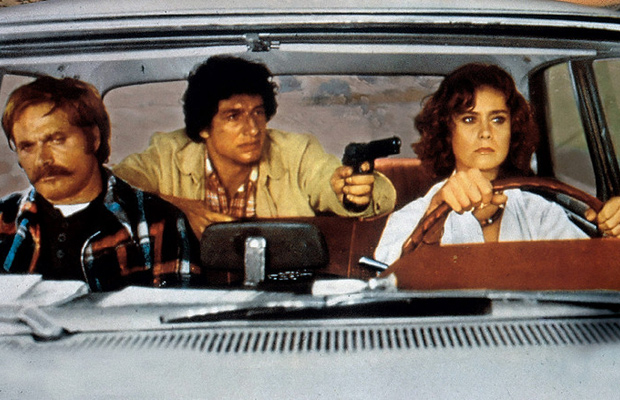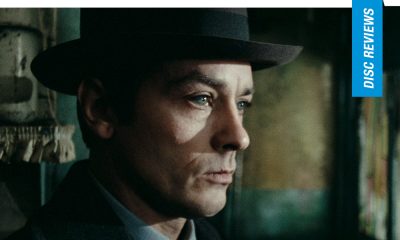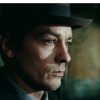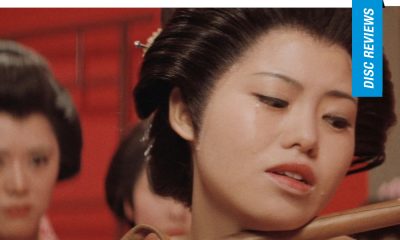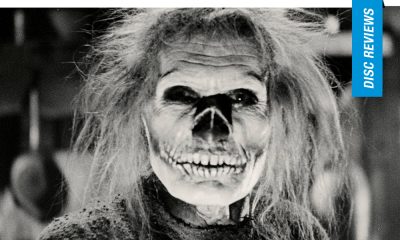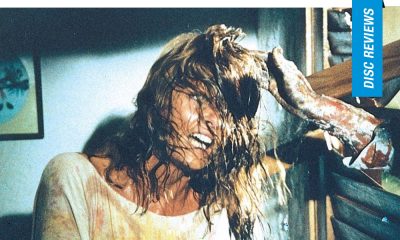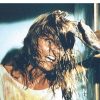Disc Reviews
Hitch Hike | Blu-ray Review
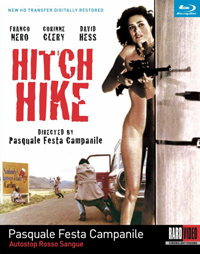 Raro Video resurrects an exploitation goodie masquerading as another bit of cheap Eurosleaze, Hitch Hike (aka Autostop Rosso Sangue) a 1977 thriller from Italian director Pasquale Festa Campanile. Like a tawdry version of an early Polanski effort, it’s a significant anomaly of its ilk for several reasons, the most notable being its director, usually known as a fixture of 1970’s Italian-style comedy (aka commedia all’italiana). Adapted from the novel The Violence and the Fury by Peter Kern, it’s headlined by Franco Nero, French actress Corinne Clery (the title character from infamous The Story of O, 1975) and grindhouse staple David Hess (The Last House on the Left, 1972), while predictable story elements spiked with moments of brutal violence should be enough to rejuvenate interest in a title not often screened in the US (despite its initial box office success in Europe).
Raro Video resurrects an exploitation goodie masquerading as another bit of cheap Eurosleaze, Hitch Hike (aka Autostop Rosso Sangue) a 1977 thriller from Italian director Pasquale Festa Campanile. Like a tawdry version of an early Polanski effort, it’s a significant anomaly of its ilk for several reasons, the most notable being its director, usually known as a fixture of 1970’s Italian-style comedy (aka commedia all’italiana). Adapted from the novel The Violence and the Fury by Peter Kern, it’s headlined by Franco Nero, French actress Corinne Clery (the title character from infamous The Story of O, 1975) and grindhouse staple David Hess (The Last House on the Left, 1972), while predictable story elements spiked with moments of brutal violence should be enough to rejuvenate interest in a title not often screened in the US (despite its initial box office success in Europe).
Walter Mancini (Franco Nero), a bitter, alcoholic journalist, is on a grueling road trip with his wife Eve (Corinne Clery) on their way to Los Angeles, recuperating from a broken arm (which explains his begrudging attitude towards his wife’s driving). Against her husband’s wishes, but perhaps in a bid to quell their constant bickering, Eve stops to offer a ride to Adam (David Hess), whose vehicle has broken down. Although he’s charming, Adam eventually proves to be one of the murderous bank robbers the police are searching for. Forced into dodging law enforcement, the couple is then subjected to Adam’s partners in crime, thirsty for vengeance after he took off with all the booty.
As Bret Wood’s insert essay asserts, Campanile’s film clearly belongs in the unclassified genre of the hitch-hiker thriller, a staple developed through several film noir tropes (most memorably in items such as 1945’s Detour and 1953’s The Hitch-hiker from Ida Lupino). It’s been resurrected repeatedly, through various art-house classics like Polanski’s debut Knife in the Water (1962), to American B-genre pictures such as The Hitcher (1986, and a 2007 remake), to even 2016’s theatrical release of the UK/France co-production of Road Games. Picking up a hitch-hiker is never a good idea, especially if there’s already a weak foundation, as evidenced by the bickering couple here. He’s a drunk, she’s (of course) sexually repressed, and the man they take pity on is a psychopathic bank robber being pursued by his two cohorts.
What is particularly interesting about Campanile’s thriller is the sexual subtext, and not just the usual power play between the female pseudo-victim and the antagonist, as Hitch Hike rather predictably plays husband and predator off one another in relation to their conquest of the woman. But whether it was due to the success of the recent Dog Day Afternoon (1975) and its marriage of bank robbery and homosexuality as subtext, Campanile and his screenwriters Aldo Crudo and Ottavio Jemma include unusually blunt conversation about the two gay bank robbers who had assisted Hess, which we’re led to believe are lovers (although it’s not clear if this is purely an invention of the Hess character’s subconscious homophobia). Whatever the case, the befuddled Nero is led to deduce ‘only homosexuals know the true meaning of love,’ an observation born from his endless sparring with Clery’s aptly named Eve (which has troubling significance when she’s ‘claimed’ by Hess’ psychopathic Adam). Of note, Campanile would direct a transgender romance only several years later, Nessuno e perfetto in 1981, one of the director’s many titles still unavailable in the US.
Though it obviously wasn’t filmed in the US despite curiously being set on stretch of desolate highway leading to Los Angeles, Hitch Hike is a lot odder than it initially seems. Many of its narrative curves are borrowed from more famous films, to be sure, Campanile still throws a lot in there, with the Mancini’s bouncing back and forth in three hostage situations before being terrorized by a clutch of hippie bikers (which leads to a rather satisfying final twist). And fans of Ennio Morricone should relish another pronounced score from the composer, a threaded thrum of an ominous guitar led theme evident throughout.
Disc Review:
Raro Video (which continues to be a significant force in distributing obscure titles from neglected Italian masters) presents this forgotten thriller in high definition, 1.78:1. The vintage frames look fantastic in this digitally restored transfer, particularly in the infrequent bouts of violence (such as a confrontation with two police officers) and when Hess is memorably dispatched by the rifle toting Clery. Plus, a documentary on the making of the film is included as an extra feature.
Road to Ruin:
This near half hour interview finds the three leads discussing their involvement in the production (with Hess remarking this film to be nearest his heart). Nero comments on his injury during the filming of Keoma which necessitated the script change in Hitch Hike. Despite the footage of Hess (who is very animated) seeming incredibly out of focus, it’s an otherwise enjoyable featurette.
Final Thoughts:
A stellar find for fans of grindhouse or Eurosleaze (although it’s quite better than either of those two definitions usually promise), Hitch Hike is an intriguing entry into Campanile’s extensive filmography.



